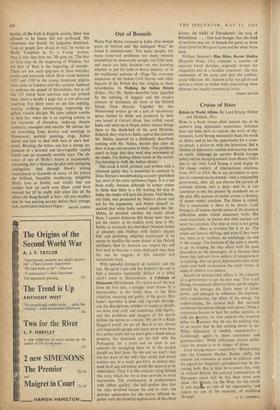Cruise of State
Ilrilain in World Affairs. By Lord Strang. (Faber and Deutsch, 30s.)
HERE is a book whose chief interest lies in its author's long diplomatic experience. Scholars have not been slow to criticise the work of dip- lomatists. Lord Strang necessarily bases his work on theirs, and so has the opportunity for a coun- ter-attack, a tit-for-tat with the historians. But a lifetime of diplomatic caution and courtesy leaves its mark. Although he surveys British foreign policy and its changing context from Henry Vill's day to our own, Lord Strang is most happy in the classic century of international relations, from 1815 to 1914. He is too percipient to pro- ject its conventions backward—only a responsible government, after all, can elevate the pursuit of national interest into a duty—and he is too courteous to test the present by standards set in the past. His account of earlier events is sketchy, of recent events anodyne. The theme is mated. Yet a conclusion is there to be drawn. Lord Strang is, of course, keenly aware of the practical difficulties under which statesmen work. But more important, he knows that their success can never be complete. The ship of state is not going anywhere : there is nowhere for it to go. The winds are forever shifting, and even if they were not, there is no harbour, no anchorage, no end to the voyage. The business of the crew is merely to go on keeping the ship afloat with the least discomfort to the passengers. It is because they know this, and not from defects of temperament or training, that all good diplomatists take short views and hold moderation the chief virtue. A sense of mission is a menace.
Success in international affairs is 'the capacity of a government to get its own way.' For Lord Strang, immediately effective force can be supple- mented by prestige, the lively sense of latent power, and enlarged by influence, the diploma- tist's contribution, the effect of his energy, his understanding, his tactical skill. But national ambitions themselves change with power. When a statesman, chooses to lead his public opinion, to rally his puntry, we may suppose the situation either so it sperate that he can do nothing else, or so secure that he has nothing better to do. When diplomacy is needed, unpopularity— Castlereagh again—'is more convenient and gentlemanlike.' While politicians remain politi- cians the maxim is in no danger of abuse.
Lord Strang rejects--tentatively—British entry into the Common Market. Rather oddly, his reasons are economic as much as political, and his regard for England's precedence may be dis- torting both. But at least he is aware that, with or without Britain, the political consequences of European union will be less than some now think—for ritain. for the West, for the world. It will dep no one of the opportunity, and relieve no one of the necessity, of muddling






































 Previous page
Previous page